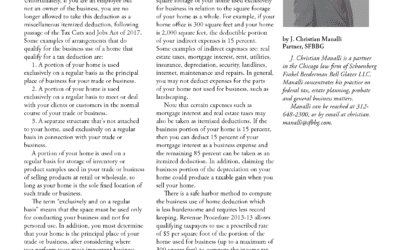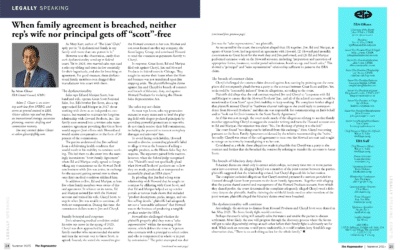Question: I took my required distribution from my IRA early in 2020. Now that the new tax law suspended the required distribution rules for 2020, is it too late for me to undo what I did?
Answer: You still have the opportunity to benefit from the new tax law on required minimum distributions (“RMDs”) although you must act promptly. A recent Internal Revenue Service notice allows individuals who took 2020 RMDs from their Individual Retirement Accounts (“IRAs”) and certain qualified retirement plans to transfer back or rollover these funds to their retirement accounts. Prior to the suspension of 2020 RMDs, IRA owners and plan participants generally had the right to return RMDs to the plans from which the funds were withdrawn within sixty days of the withdrawal. The IRS has extended the 60-day withdrawal period to August 31, 2020 for taxpayers who took RMDs from IRAs and many types of employer-sponsored plans. Accordingly, If you repay your 2020 RMDs on or before this date, you can avoid the income tax obligation that you normally would have incurred and let the funds continue to accumulate in a tax deferred account.
The Internal Revenue Code has long required taxpayers to withdraw funds from their IRAs when they reach certain ages. Similar rules apply to participants in qualified retirement plans such as 401(k) plans and pension and profit-sharing plans who own five percent or more of the employer sponsoring the retirement plan. Until the recently enacted Secure Act, required minimum distributions for a taxpayer had to commence by the taxpayer’s required beginning date, April 1 of the calendar year following the year in which the taxpayer attains age 70 ½. The Secure Act extended each taxpayer’s required beginning date to April 1 of the calendar year following the year in which the taxpayer attains age 72. As was the case prior to the enactment of the Secure Act, once RMDs commence, distributions must continue on an annual basis over the taxpayer’s life expectancy as determined by IRS prescribed tables.
The RMD rules force taxpayers to begin withdrawing funds from retirement accounts and pay tax on funds which have accumulated on a tax deferred basis. For many taxpayers, the rules are unnecessary as retirees often have the need to withdraw funds for routine living expenses. For high net worth individuals, the RMD rules can be burdensome since many such persons have other funds to pay for their living expenses and prefer to not only avoid the tax on the distributions, but to permit their retirement funds to remain in an IRA or other retirement plan and continue to earn income on a tax deferred basis. For these taxpayers, the waiver of the RMD rules for 2020 is a blessing.
Taxpayers who do not need the funds and have not taken their 2020 RMDs should simply refrain from taking any RMDs during the 2020 calendar year. For those who have already taken 2020 RMDs and who do not need the funds, they should return the retirement plan funds by August 31, 2020 or, if later, withing sixty days of the date of the withdrawal, thereby allowing themselves to take advantage of the tax savings.
It is noteworthy that this is the second time in the last 11 years that Congress has eliminated the RMD requirement for a particular tax year, the other being during the great recession in 2009. While Congress waived these rules for 2020, the IRS has generously extended the time period for the repayment of funds from the statutory sixty days of the withdrawal. Should circumstances arise in the future where Congress similarly waives the RMD rules for a particular year, there is no certainty that the IRS will be as generous in extending the sixty-day repayment period. Taxpayers subject to the RMD rules who do not want to miss an opportunity that may arise in the future should a similar legislative change be made might consider taking RMDs at the end of each calendar year rather than at the beginning of the year.
A version of this article has been published by Forbes.
The Tax Corner addresses various tax, estate, asset protection and other business matters. Should you have any questions regarding the subject matter or if you have questions you want answered, you may contact Bruce at (312) 648-2300 or send an e-mail to Bruce Bell.



